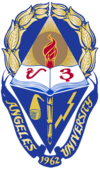
Lyceum of the Philippines University also referred to by its acronym LPU is a private, non-sectarian, coeducational higher education institution located at intramuros in the City of Manila, Philippines. It was founded in 1952 by José P. Laurel, who was the third president of the Republic of the Philippines.
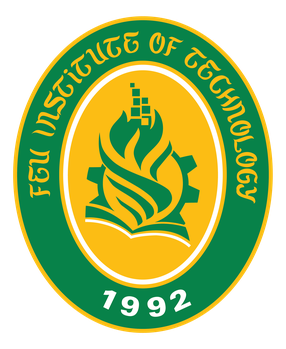
FEU Institute of Technology, also referred to as FEU Tech, is a private, non-sectarian, coeducational higher education institution in Sampaloc, Manila, Philippines. It offers courses in the fields of Engineering and Computer Studies. Established in 1992 as East Asia Computer Center, Inc.(EACCI), an educational partnership of Asia Pacific Computer Technology Center, Intelligent Wave Inc., and Far Eastern University.

The Emilio Aguinaldo College is a private university based in Manila, Philippines.
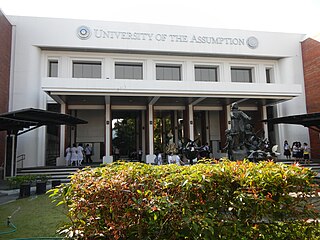
The University of the Assumption (U.A.) is a private archdiocesan Catholic university in the City of San Fernando, Pampanga, Philippines. The University of the Assumption is the first Catholic archdiocesan university in the Philippines and in Asia. It is among the top schools in the region, based on its accredited programs, and licensure and professional examination results.
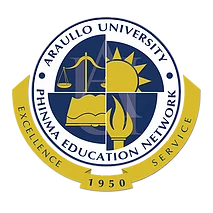
Araullo University, also referred to by its acronym "AU " or simply "Araullo", is a private, non-sectarian secondary and higher education institution in Cabanatuan, Nueva Ecija, Philippines. It was established in 1950. The university offers a wide range of secondary, undergraduate and graduate programs in its three campuses.

The PHINMA – University of Iloilo is a private, nonsectarian, coeducational institution in Iloilo City, Philippines. It was established in 1947 by the López family of Iloilo who founded the broadcasting giant ABS-CBN Corporation as Iloilo City Colleges. The university was later acquired by the business conglomerate group PHINMA Industries, and its current operations and management is controlled by the said company under its arm, PHINMA Education Network.

Arellano University (AU) is a private, coeducational, nonsectarian university located in Manila, the Philippines. It was founded in 1938 as a law school by Florentino Cayco Sr., the first Filipino Undersecretary of Public Instruction. The university was named after Cayetano Arellano, the first Chief Justice of the Supreme Court of the Philippines. It operates seven campuses located throughout Metro Manila and the main campus is located along Legarda Street, Sampaloc, Manila. The Arellano University School of Law is autonomous and managed by the Arellano Law Foundation. Its athletic team, the Arellano University Chiefs, is a member of the National Collegiate Athletic Association since 2009.
The University of the East College of Computer Studies and Systems offered a baccalaureate degree in Computer Science in the University Belt area starting in the year 1988. Presently, the Commission on Higher Education (CHED) has identified the University of the East as a Center of Excellence in Information Technology Education.

The Philippine Normal University is a public coeducational teacher education and research university in the Philippines. It was established in 1901 through Act No. 74 of the Philippine Commission "for the education of natives of the Islands in the science of teaching". It has campuses in Manila, North Luzon, South Luzon, Visayas, and Mindanao. Pursuant to Republic Act No. 9647, it is the country's National Center for Teacher Education.

The Eulogio "Amang" Rodriguez Institute of Science and Technology is a public college in Santa Mesa, Manila in the Philippines. It was named after Eulogio Rodriguez, one of the longest serving senators in the country.
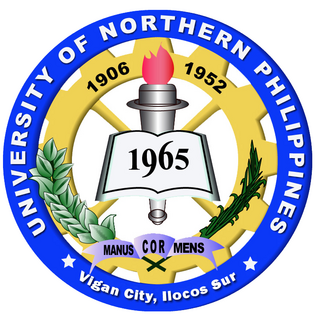
The University of Northern Philippines is a university in Barangay Tamag, in the City of Vigan in the province of Ilocos Sur, Philippines. It is the first and oldest state university in Northern Luzon which offers low tuition fee, tracing its roots to 1906, which is older than the University of the Philippines by two years. It is the only state university in the province aimed for less-fortunate people and one of three state-owned educational institutions of higher learning operating in Ilocos Sur.

The University of La Salette is a private Catholic, coeducational basic and higher education institution run by the Missionaries of Our Lady of La Salette in Santiago City, Philippines. Founded by the La Salettes in June, 1951, it is now one of the top performing universities in the region.
Southern Luzon State University, formerly known as Southern Luzon Polytechnic College (SLPC), is the premier, state-funded higher education institution in Quezon Province in the Philippines operating by virtue of Republic Act 9395. It is composed of 11 campuses in the province of Quezon, with the main campus situated in the Municipality of Lucban.
The Laguna State Polytechnic University is a state university in the Province of Laguna, Philippines, with four regular campuses and several auxiliary sites. It is currently classified as SUC Level III.

Capitol University is a non-sectarian, co-educational private university located in Cagayan de Oro, Philippines. It is registered with the Securities and Exchange Commission as a stock corporation and operates with the authority of the Department of Education for its primary and secondary programs and the Commission on Higher Education for its tertiary, graduate and postgraduate programs.
The Olivarez College, also known as simply Olivarez or OC, is a private, nonsectarian college along Dr. A. Santos Avenue, Parañaque, Philippines that offers academic programs in basic education, junior and high school, undergraduate, graduate and technical education levels. Founded in 1976, Olivarez College is the only school in Parañaque City that is accredited by the Philippine Accrediting Association of Schools, Colleges and Universities (PAASCU) and the Philippine Association of Colleges and Universities - Commission on Accreditation (PACUCOA). It is a member of the Universities and Colleges Athletic Association (UCAA) and National Capital Region Athletic Association (NCRAA).

The DMC-College Foundation, Inc. (DMC-CFI), also known as DMC De La Salle, supervised by De La Salle Brothers, is a paramedical institution of the province of Zamboanga del Norte. It is situated in suburban Dipolog and occupies 22,500 square meters of land area. Its sprawling expanse contains several buildings which include the DMC Hospital and its laboratories, the four-storey Basic Education and School of Hotel Restaurant and Institution Management Building, the six-room IT Center, the four-storey Nursing Building with the Nursing Arts Center on the fourth floor and on the top floor the campus radio 100.5 Radyo Natin Dipolog and the library which covers the entire ground floor, the Arts and Sciences building with separate structures for a Zoology lab, the cafeteria, and the DMC Covered Court for sports and other activities.
The Holy Trinity College of General Santos City is a school in General Santos, Philippines. It is a non-sectarian school duly registered in the Securities and Exchange Commission, through its Davao City office. Holy Trinity College of General Santos was established by the Albano Family, as a Pre-school in 1984 and registered as a College in 1989.

Meycauayan College, is a private, non-sectarian basic and higher education institution in Meycauayan City, Philippines. It was established in 1925 and initially named Meycauayan Institute.
The University of Cagayan Valley (UCV) is a private, non-sectarian university located in Tuguegarao, Cagayan, Philippines. It was formerly known as Cagayan Teachers College and Cagayan Colleges Tuguegarao.
